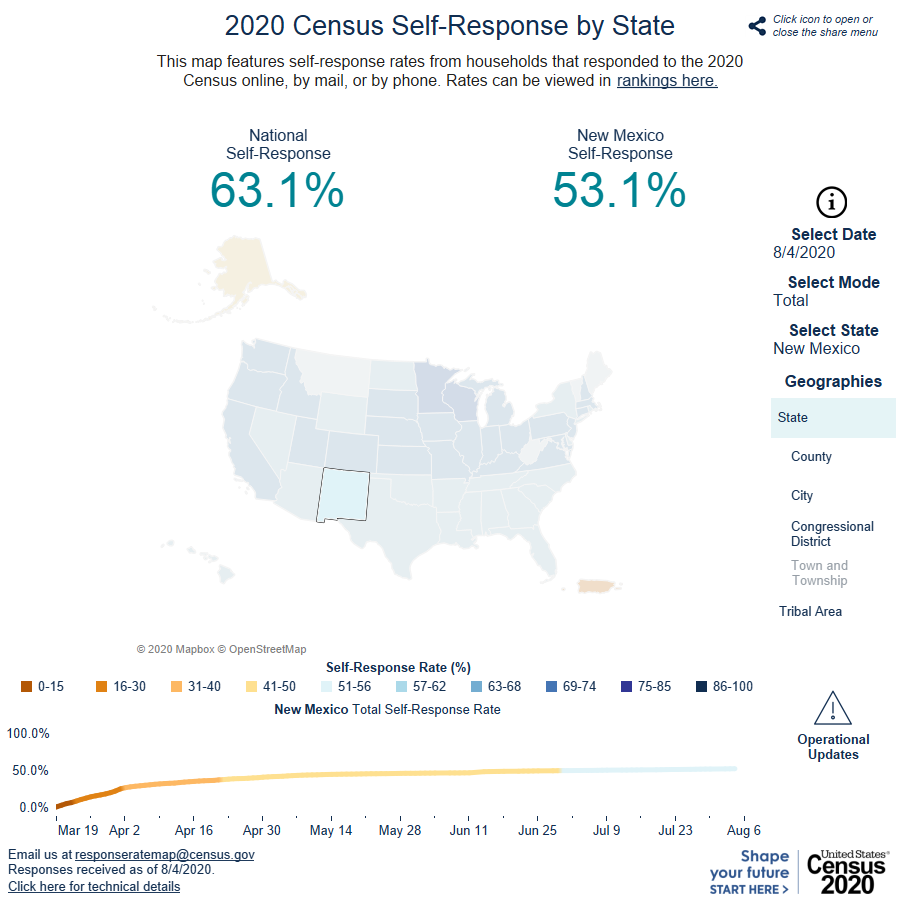New Mexico’s tribal communities suddenly find themselves in a rush to reorganize their plans to ensure a complete census count after federal authorities this week abruptly moved the deadline up by a month, from the end of October to September 30.
“We have pretty much lost a month of time to be able to gain that accurate count in our communities,” said Ahtza Dawn Chavez, Executive Director of the Native American Voters Alliance Education Project, speaking to state leaders on Tuesday during a legislative hearing at the Roundhouse in Santa Fe.
“Our average self response rate is just over 30 percent,” Chavez said. “We have a lot of work to do going forward.”
American Indian leaders across the country have reacted strongly to the news. In a joint statement issued Wednesday, national Native organizations said they were “deeply alarmed and concerned with this unwarranted and irresponsible decision.”
We have a lot of work to do going forward.
— Ahtza Dawn Chavez
“Our tribal nations and tribal communities have been ravaged by COVID-19, and an extension of the Census enumeration period was a humane lifeline during an unprecedented global health catastrophe that provided critically needed additional time to tribal nations to ensure that all of everyone in their communities are counted,” the statement said.
In a separate statement, U.S. Rep. Deb Haaland, D-NM, who made history in 2018 as one of two indigenous women elected to Congress, said changing the deadline “flies in the face of Director (Steven) Dillingham’s promise to me that he understood the importance of meeting our needs.”
The once-a-decade census count provides population numbers that determine to a large degree how much public money flows to tribes and other communities through federal, state and local funding programs. The new deadline threatens to increase chances for an undercount in tribal communities that currently have a response rate far below the national rate of 63%.

The presentation by Chavez to the New Mexico Indian Affairs Committee highlighted how the COVID-19 pandemic has hindered the census count. Census officials need access to tribal lands to complete the count. Their work includes door-to-door drops of census packets and in-person follow-up visits to homes that haven’t responded.
But census workers need permission of tribal authorities to enter tribal communities, and several tribes in New Mexico, which have been disproportionately hard-hit by the pandemic, are currently closed to non-members due to the public health emergency. At the same time, media messages have informed tribal members to not respond to the census until they receive a packet at their door, by those same census workers.
Compounding the access problem is a shortage of census workers, Chavez said. Some workers decided to no longer work for the census because they don’t want to go door to door during the pandemic. Chavez told lawmakers an undercount of just 1% could hurt New Mexico’s tribes by a combined $43 million in federal funding.
State Rep. Derrick Lente, a Democrat from Sandia Pueblo whose district covers the Jicarilla Apache Nation, seven Pueblos and five chapters of the Navajo Nation, said the pandemic is overshadowing the census among tribal leaders in his district. “No discussion at all about Census, it’s all about COVID. That’s where they’re at, trying to save lives,” Lente said.
Both Chavez and Lente raised the possibility of using tribal data to make up for undercounts in tribal communities. For instance, utility and tribal enrollment data could be used to provide a headcount of households and the number of people who live in each household.
“Nobody knows their community better than those that work in their communities,” Lente said. “Especially during this time of COVID when restrictions are so strict as to who comes and who goes, we now know more than ever who is living within our own community.”
Meanwhile, the Census continues seeking workers.
Hi, I’m the (first-ever) Professor of Practice in Journalism at University of New Mexico in Albuquerque. So I’m very involved in helping students learn multimedia journalism. Before New Mexico, I was the 2012-2013 Reynolds Chair in Ethics of Entrepreneurial and Innovative Journalism at the University of Nevada, Reno… and, before that, a 2011 Knight Journalism Fellow at Stanford University. I’m also very active as a consultant, having spent over 25 years as a news director. My website is http://www.mikemarcotte.com or on Twitter: http://twitter.com/michvinmar